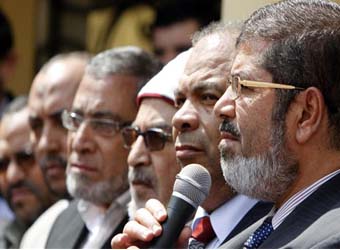Islamists across the Middle East and north Africa enraged by the ousting of Mohamed Morsi’s elected government see in the July 3 coup a conspiracy by reactionary elements associated with the pre-Arab Spring regime. This view has been reinforced by the ensuing military crackdown, most notably the two Cairo massacres of Morsi supporters as the armed forces declared war on “terrorism”.
But if they want to avoid Egypt’s fate, they would also do well to examine and learn from the many mistakes Mr Morsi and his Muslim Brotherhood made during their two-and-a-half years in power.
After electoral successes in 2011 and 2012, it has been a litany of setbacks for Islamists in Egypt, Tunisia, Libya and Morocco. Though entrenched interests have contributed to the Islamists’ failures, they themselves have also had a major hand in their own slide from grace.
Mesmerised by poll successes, Egypt’s Brotherhood and its allies failed to see their declining popularity and the fluid and transitional nature of the period following the revolution, the fickleness of public opinion and the shallowness of their initial public support. Even as Mr Morsi’s supporters and democracy advocates at home and abroad trumpet the legitimacy of their government overthrown by the armed forces, many critics question its understanding of democratic governance.
“Legitimacy is not only about elections,” said Abdel Basset Ben Hassan, a Tunisian human rights activist. “We are in a very fragile and complicated transition, and legitimacy is also about reforming institutions and developing the country and resolving problems of marginalisation, and if the political parties don’t listen to these needs, they will not gain legitimacy.”
Unlike Tunisia’s Nahda party or Morocco’s Justice and Development party, Egypt’s Brotherhood initially partnered with the army against liberals and leftists to push through a flawed transitional process, and then with the hardline Islamists against the liberals and leftists to gain control of parliament and the presidency, and to push through a constitution. The ill-chosen alliances eventually drove the leftists and liberals into the arms of supporters of deposed president Hosni Mubarak, the armed forces and a pliable judiciary.
“Morsi didn’t learn the mistakes of Mubarak, and created a lot of enemies,” said Khalil al-Anani, an Egypt scholar at Durham University. “He should have collaborated with and reached out to other revolutionary forces. Not doing so was a big miscalculation.”
A series of blunders made it clear the increasingly isolated Mr Morsi was heeding no one’s counsel but his own. Warnings and friendly advice by liberals, leftists, armed forces commanders and western diplomats were politely brushed off. As the president and his coterie became more isolated, they made appointments that showed they valued loyalty over competence at a time the public desperately craved improvements in their lives and in their institutions.
”They didn’t try to reform the state; they tried to ride the state,” said Mr Anani.
Islamists in other countries managed to avoid some of the Brotherhood’s mistakes, for example, by largely separating their political organisations from the messianic religious reform movements that inspired them. Mr Morsi could never shake off the public perception that he was being guided and directed by the leadership of the Brotherhood, even at the cost of his own political interests.
Egypt’s Brotherhood also badly damaged its credibility – perhaps for years to come – by repeatedly reneging on promises not to pursue certain electoral goals, like sweeping the parliament or fielding a presidential candidate.
But in some cases, Islamists keep making the same mistakes as Mr Morsi and secular Arab leaders. As in Egypt, Islamists in power in Tunisia and Morocco keep touting happy talk about the economy and their threadbare accomplishments over acknowledgment of people’s hardships and harsh truths about their countries’ considerable fiscal challenges.
Last but not least, Egypt’s Brotherhood, like its counterparts in other Arab countries, seemed hopelessly out of tune with the irreverent spirit of youth and women, who went to the streets in 2011 in part for the right to mock their leaders. At a time when satirist Bassem Youssef became one of the Arab world’s biggest celebrities, Mr Morsi and his allies became caricatures of the same stuffy, stuck-up leaders of the past who were shut off from the people they ruled.
“Our societies are composed of largely young people and women,” says Mr Ben Hassan. “They are waiting for their rights, and we cannot ignore them.”
Source: The Financial Times


